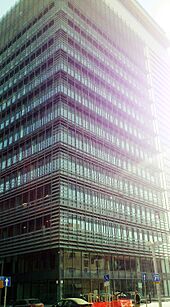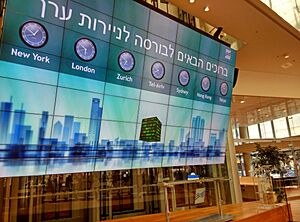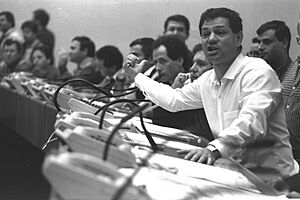Tel Aviv Stock Exchange facts for kids
| Tel Aviv Stock Exchange | |
|---|---|
Quick facts for kids  |
|
 |
|
| Type | Stock exchange Public company |
| Location | [[Tel Aviv]], Israel |
| Founded | 1953 (precursor 1935) |
| Owner | 15 banks and 11 investment houses |
| Key people | *Arik Steinberg (chairman)
|
| Currency | Israeli agora |
| No. of listings | 473 companies listing equities 901 series of corporate bonds 204 series of government bonds 416 index-tracking products 1,231 mutual funds |
| MarketCap | Equities: US$ 216 billion; Bonds: US$ 196 billion |
| Volume | 546 million US$ daily (2010) |
| Indexes | *TA-35 Index
|
The Tel Aviv Stock Exchange (TASE), often called The Bursa, is the only public stock exchange in Israel. It's a place where companies can raise money by selling parts of their business (called shares or equities) or by borrowing money (called bonds). People and organizations can also buy and sell these shares and bonds. TASE is a public company itself, meaning its own shares are traded on its exchange. It follows rules set by the Securities Law (1968) and is watched over by the Israel Securities Authority (ISA).
TASE is very important for the Israeli economy. It helps companies and the government get the money they need. Only 23 special members, mostly big banks and investment firms, can trade directly on TASE. They charge a fee for their services. TASE started in 1953, but there was a similar trading place as early as 1935. As of 2021, many different types of investments are listed on TASE, including shares from 473 companies and thousands of bonds and other products. The total value of all shares traded is about US$216 billion, and bonds are worth about US$196 billion.
Contents
History of the Tel Aviv Stock Exchange
The Tel Aviv Stock Exchange officially began in 1953. Before that, starting in 1935, people traded securities at the Anglo-Palestine Bank (now Bank Leumi). This early trading happened for just one hour each day. In 1968, new laws were made to control TASE's activities, and the Israel Securities Authority was created to supervise it.
Key Moments in TASE's Journey
In 1983, TASE faced a difficult time called the "bank stock crisis." During this crisis, the value of shares from Israel's biggest banks dropped sharply. In the same year, TASE moved to a new building on Ahad Ha'Am Street in Tel Aviv.
In 1993, TASE started trading derivatives, which are financial tools whose value comes from other assets. By 1999, TASE stopped using physical trading floors and switched to a fully automated computer system called TACT. This meant all trading was done electronically.
In 2000, a law was changed to make it easier for companies already listed in the United States to also list their shares on TASE. This "dual listing" was later expanded in 2005 to include companies listed on the London Stock Exchange and Nasdaq. Today, many companies are listed on TASE and other exchanges at the same time.
After the 2008 global financial crisis, new rules were put in place, and trading volumes on TASE became lower for a while. In 2016, TASE started a project to help high-tech companies by providing special reports about them.
Changes to TASE Indexes
In 2017, TASE made big changes to its stock market indexes, which are like groups of shares that show how different parts of the market are doing. These changes aimed to make the indexes more stable and fair. For example, the main index, the Tel Aviv 25, was expanded to include 35 shares and was renamed the TA-35 Index. This helped spread the risk so that the index wasn't too dependent on just a few large companies. New indexes were also created to attract more investors.
Also in 2017, TASE changed its ownership structure. It became a for-profit company, meaning it could earn money like other businesses, instead of being owned by its trading members. This change was approved by the Israeli government. In 2018, a new company called the Nominee Company was set up. It helps make sure that shares are properly recorded and that payments, like dividends (money paid to shareholders), reach the right people. In August 2019, TASE's own shares started trading on its exchange.
TASE Members: Who Can Trade?
The Israeli Stock Exchange has 23 members who are allowed to trade directly. These include:
- 3 Foreign Banks:
- Barclays Bank PLC (UK)
- Citibank, N.A. (USA)
- HSBC Bank PLC (UK)
- 11 Israeli Commercial Banks:
- Union Bank of Israel Ltd.
- Israel Discount Bank Ltd.
- Mercantile Discount Bank Ltd.
- Bank Hapoalim B.M.
- Bank of Jerusalem Ltd.
- Bank Leumi Le-Israel B.M.
- Mizrahi Tefahot Bank Ltd.
- Bank Yahav Government Employees Ltd.
- First International Bank of Israel Ltd.
- Bank Otsar Ha-Hayal Ltd.
- Bank Massad Ltd.
- 2 Foreign Investment Houses:
- UBS Securities (Switzerland)
- Citigroup Financial Products Israel (UK)
- 5 Israeli Investment Houses:
- Excellence Nessuah Brokerage
- Psagot Securities
- Meitav Dash Trade
- Israel Brokerage and Investments IBI
- 3 Remote Members:
- Merrill Lynch International
- Flow Traders B.V
- Jefferies
TASE's Buildings
TASE has moved several times. In 1960, it moved to 113 Allenby Street in Tel Aviv. In 1983, it moved again to 54 Ahad Ha'Am Street. In 2001, a Visitors Center was opened in the old trading floors, where people could learn about the stock exchange. On July 24, 2014, TASE moved to its current, modern building on the corner of Montefiore Street and Ahuzat Bayit Street. This 14-story building is 60 meters tall and took five years to build.
Leaders of TASE
| CEOs | year |
|---|---|
| Mordechai Zagagy | 1953 |
| Zeev Ottensosser | |
| Yossi Nitzani | 1980-1983 |
| Ester Levanon: | June 2006 – December 2013 |
| Yossi Beinart: | January 2014 – September 2016 |
| Gal Landau-Yaari: | September 2016 – January 2017 |
| Ittai Ben Zeev: | January 2017 - today |
| Chairmen | |
| Ernest Lehman | 1953 |
| Meir Chet | 1978 – 1986 |
| Chaim Shettsel: | 1986 – 1996 |
| Yair Orgler: | 1996 – 2006 |
| Saul (Sam) Bronfeld | 2006 – 2013 |
| Amnon Neubach | 2014 – 2021 |
| Arik Steinberg | 2021-today |
TASE's Growth and Performance
In 1993, TASE had the third-highest number of IPOs (when a company first sells shares to the public) compared to all other stock exchanges in the world.
By 2005, foreign investors put a record amount of money into TASE, and the main TA-25 index grew by 34%. Big international banks like UBS, Deutsche Bank, and HSBC became members of TASE. In 2007, the average daily trading reached $500 million, a big increase from the year before. The number of exchange-traded funds (ETFs), which are like baskets of investments, also grew a lot.
As of May 2010, some of the largest companies traded on TASE included Teva Pharmaceutical Industries, Israel Chemicals, Bank Leumi, and Bezeq. In 2009, the total value of all shares and bonds traded on TASE was about $386 billion. The TA-25 index reached a record high of 1,239 points in April 2010.
For the ten years leading up to February 2012, the TA-25 index was one of the best-performing indexes globally, even when considering how risky it was. In 2013, both the CEO and Chairman of TASE resigned. This happened after trading volumes dropped and TASE was not included in an important European index.
Increase in Trading in 2020
In 2020, the average daily trading volume on TASE's stock market increased by about 35% compared to previous years. This big jump was mainly because of the global coronavirus pandemic, which caused a lot of activity and changes in the markets.
Many more regular people in Israel also started investing in the stock market in 2020. About 141,000 new investment accounts were opened, which was a 44% increase from 2019. Investment firms that were not banks saw an even bigger increase in new customers.
Dividends in 2023
Even with big events like war and legal changes in 2023, about 40% of the companies on the Tel Aviv Stock Exchange still paid out dividends to their shareholders. Dividends are a portion of a company's profits paid to its investors. Companies in energy, oil, gas, banking, and financial services paid notable dividends.
TASE reported that 206 companies paid out about 27.2 billion shekels in dividends in 2023. This was a little less than the record high in 2022. The percentage of shares owned by the public has slowly grown, reaching 63.3% by the end of 2023. This meant that the public received a larger share of the total dividends. In 2023, public shareholders received about 62% of all dividends, which was a record amount for them. The average dividend yield (the amount of dividend compared to the share price) in 2023 was about 2.9%, the highest since 2017.
International Partnerships
TASE has signed agreements with other major stock exchanges around the world. In 2007, it signed a deal with the London Stock Exchange to make trading easier for companies listed on both exchanges. A similar agreement was made with The Nasdaq Stock Market in November 2007. In July 2008, TASE partnered with NYSE Euronext. Later, in November 2008, TASE signed an agreement with the Shanghai Stock Exchange to learn from each other and promote trade. In 2010, TASE also signed a partnership with the Toronto Stock Exchange.
How TASE Works
Operating Hours
TASE operates from Sunday through Thursday. It is closed on Fridays because it's a short workday in Israel, and it also closes on Israeli national and religious holidays. Sometimes, there are discussions about changing the trading days so TASE would be closed on Sundays (like most global exchanges) and open on Fridays.
Trading on TASE happens in different stages:
- "Pre-opening": Before trading officially starts.
- "Opening auction": When trading begins for the day.
- "Continuous trading": The main trading period.
- "Pre-closing": Before trading ends.
- "Closing auction": When trading officially closes for the day.
On regular workdays, trading usually runs from 9:25 AM to 5:25 PM local time. Since March 2020, Sunday trading sometimes ends earlier. There are reports that TASE might start operating on Fridays in the future, which could help it be included in the European MSCI index.
What You Can Trade on TASE
Several types of financial products are traded on TASE:
- Equities: These are shares that represent a small part of a company's ownership.
- Bonds: These are like loans you give to a company or the government. They promise to pay you back with interest.
- Corporate bonds: Bonds issued by companies.
- Government bonds: Bonds issued by the Israeli government.
- "Makams" (T-Bills): Short-term loans to the Bank of Israel, lasting up to one year.
- Convertible bonds: Special bonds that can be turned into shares of a company later.
- Exchange Traded Notes (ETNs): These track the price of a product or a financial index. Some ETNs move in the opposite direction of an index.
- Exchange Traded Funds (ETFs): These are like investment funds that try to match the performance of a specific index, like a group of stocks. You can buy and sell them on TASE like regular shares.
- Mutual funds: These are funds managed by experts who invest money for you based on a plan.
- Option warrants: These give you the right to buy shares or bonds at a certain price later.
- MAOF market (derivatives): This is where more complex financial tools like options and futures contracts are traded. These are based on indexes, individual shares, or exchange rates. Options on the TA-35 Index are very popular here.
- TASE UP: This is a special platform for private companies to raise money from big investors without becoming a public company. Companies on TASE UP don't have to follow all the same rules as public companies.
- TASE Data Hub: Launched in 2020, this system lets people access TASE's financial data using special computer programs or daily reports.
Fees for Trading
TASE charges fees to its members for every trade. These fees are very small. However, if you want to trade on TASE, you usually do it through one of the TASE members (banks or investment houses). They charge their own fees, which can be much higher, especially for people who don't trade very often. Banks might charge 100-200 times more than TASE's fee. Investment houses usually charge less, about 20 times TASE's fee.
Big investors who trade a lot usually get much lower fees. Banks also charge other fees, like "custodianship fees," which used to be for keeping paper stock certificates safe. In today's digital world, most investment houses don't charge this fee anymore, and banks are starting to waive it for some customers. TASE publishes a table on its website so you can compare different trading fees.
Companies Listed on TASE
In the 1960s, only about 80 companies were listed on TASE. By January 2021, there were 457 companies listed, with a total market value of 837 billion Israeli New Shekels (NIS).
| Type of Company | Number of Companies on TASE | Market Cap in NIS billions |
| Banks | 7 | 107 |
| Insurance | 7 | 25 |
| Financial services | 24 | 20 |
| Biomed | 51 | 92 |
| Technology | 89 | 214 |
| Commerce and services | 67 | 72 |
| Real estate and construction | 87 | 155 |
| Industry | 60 | 74 |
| Investment and holdings | 37 | 38 |
| Oil and gas exploration | 28 | 40 |
| Total | 457 | 837 |
The TASE Indexes
Since the big changes in 2017, TASE has two main groups of shares:
- The Rimon universe: This group includes about 230 larger shares that are often used for derivatives. They have higher values and stricter rules.
- The Tamar universe: This group has about 350 shares, including smaller companies and those with less public trading.
Market Cap Equity Indexes
These indexes group companies based on their total market value:
| Index name | Description |
|---|---|
| TA-35 Index | This index includes the 35 largest shares on TASE from the Rimon universe. It's a very important index, and you can trade options based on it. |
| TA-125 Index | This index includes the 125 largest companies on TASE from the Rimon universe. It combines the TA-35 Index and the TA-90 Index. |
| TA-125 Fossil Free Index | This index includes the 125 largest companies from the Rimon universe, but it excludes companies involved in producing fossil fuels. It started in December 2020. |
| TA-90 Index | This index includes the 90 largest companies from the Rimon universe, after the TA-35 companies. |
| A-SME60 Index | This index represents the 60 companies with the highest market value from the Rimon universe, after the TA-125 companies. |
| The TA-Growth | This index includes all the shares from the Tamar universe that are not in the TA-125 or TA-SME60 indexes. |
| TA-AllShare Index | This index includes all Israeli shares from the Tamar universe. It was first published in July 2010. |
Sectoral Equity Indexes
These indexes group companies based on the industry they belong to:
| Index name | Description |
|---|---|
| TA-Banks5 | This index includes the five largest banks from the Rimon universe. |
| TA-Finance | This index includes all financial shares (banks, insurance, financial services) from the Tamar universe. |
| TA Insurance-Plus Index | This index includes all insurance and financial services shares (but not banks) from the Tamar universe. It started in April 2011. |
| TA-RealEstate Index | This index includes all real estate shares on TASE from the Tamar universe. |
| TA-Construction Index | This index includes all shares in the Real Estate-Construction sector from the Tamar universe. It started in February 2020. |
| TA-Investment Properties in Israel Index | This index includes all shares in the Investment Properties in Israel sector from the Tamar universe. It started in February 2020. |
| TA-Investment Properties Abroad Index | This index includes all shares in the Investment Properties Abroad sector from the Tamar universe. It started in February 2020. |
| TA-Biomed Index | This index tracks companies involved in life sciences, biotechnology, medicines, and medical devices. |
| TA-Technology | This index tracks companies in science services, software, Internet, electronics, optics, and communication systems. |
| TA Global-Blue Tech Index | This index combines all the shares from the TA-Technology Index and the TA-Biomed Index. It started in April 2011. |
| The TA Tech-Elite Index | This index includes shares from the TA Global-BlueTech Index that have a market value over NIS 75 million. It started in May 2014. |
| The TA-Cleantech Index | This index includes all shares from the Tamar universe in the green energy field. It started in November 2020. |
| The TA-Energy Utilities Index | This index includes shares in the energy sector and green energy. It started in July 2019. |
| The TA Oil & Gas Index | This index includes all shares from the Tamar universe in the oil and gas exploration field. It started in April 2011. |
| The TA Communications
and Information Technology Index |
This index includes all shares from the Tamar universe in the communications and information technology field. It started in April 2011. |
Value Equity Indexes
These indexes focus on companies with certain characteristics, like paying dividends or having good social responsibility:
| Index Name | Description |
|---|---|
| TA-Family Index | This index includes Israeli shares from family-owned businesses that are part of the Rimon universe. It started in October 2018. |
| Tel-Div Index | This index includes large shares that consistently pay a dividend yield of at least 2%. It started in July 2006. |
| TA-Maala Index | This index includes shares of public companies that have a "Maala" rating for corporate responsibility (ESG), which means they meet certain social, environmental, and ethical standards. It started in February 2005. |
Tel Bond Indexes
These indexes track different types of bonds:
| Index Name | Description |
|---|---|
| Tel-Bond 20 Index | This is the main bond index. It includes the 20 largest CPI-linked (linked to inflation), fixed-interest corporate bonds that have a good rating. |
| Tel-Bond 40 Index | This index includes the 40 next largest CPI-linked, fixed-interest corporate bonds with good ratings, not already in the Tel-Bond 20 Index. |
| Tel-Bond 60 Index | This index combines all the bonds from the Tel-Bond 20 Index and the Tel-Bond 40 Index. |
| Tel-Bond-CPI
Linked Index |
This index includes all CPI-linked, fixed-interest corporate bonds with good ratings. |
| Tel-Bond
Non-Linked Index |
This index includes corporate bonds that are not linked to inflation. |
| Tel-Bond- CPI-Linked Yeter Index | This index includes CPI-linked, fixed-interest corporate bonds with good ratings that are not in the Tel-Bond 60 Index. |
| Tel-Bond-Yields Index | This index includes CPI-linked, fixed-interest corporate bonds with specific ratings from Maalot or Midroog. |
| Tel Bond-CPI-Linked Banks Index | This index includes CPI-linked, fixed-interest corporate bonds issued by banks that have good ratings. |
| Tel Bond-Shekel Index | This index includes non-linked, fixed-interest corporate bonds with good ratings. |
| Tel Bond-Floating Index | This index includes corporate bonds where the interest rate can change (floating interest). |
| Tel Bond Shekel-50 Index | This index includes the corporate bonds of the 50 largest companies connected to Israel, which are part of the Tel Bond-Shekel Index. |
| Tel Bond-Dollar Index | This index includes corporate bonds linked to the US dollar that have good ratings. |
Rules and Regulations
TASE follows the rules of the Securities Law of 1968, and the Israel Securities Authority makes sure it operates correctly. For a company to be listed on TASE, it must meet certain requirements both when it first offers shares and while its shares are traded. These rules are in the TASE Code, which is updated often to keep up with changes in the Israeli financial market.
Dual Listing Rules
In 2000, the law was changed to make it easier for companies already listed on other major stock exchanges (like NASDAQ, NYSE, or the London Stock Exchange) to also list their shares on TASE. This is called "dual listing." These companies can use their overseas reports and rules, with fewer extra requirements from Israel. It also became easier for Israeli companies to list on foreign exchanges.
Because more Israeli companies wanted to list in places like Singapore and Hong Kong, the dual-listing rules were expanded in June 2018 to include these exchanges, as well as Toronto.
See also
 In Spanish: Bolsa de Tel Aviv para niños
In Spanish: Bolsa de Tel Aviv para niños
 | Tommie Smith |
 | Simone Manuel |
 | Shani Davis |
 | Simone Biles |
 | Alice Coachman |



